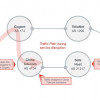Bandwidth caps could lead to ISPs benefiting from piracy
Bandwidth caps are almost universally loathed, except by the companies that implement them. Consumers hate them because they have to treat the Internet not as an inexhaustable resource, but as something that's doled out to them. Each page they view, video they watch, or song they stream moves the needle closer to zero with the resultant overage charges. Tech companies don't like them either. Video services such as Joost and Vuze rely on P2P to deliver their goods, and that, too is going to keep the bandwidth meter spinning, as will an HD rental from your Apple TV. Even sites like Hulu and YouTube may see less traffic from metered households.
How did we get into this position? It's a result of cable ISPs essentially doing the equivalent of an airline overbooking a flight. But instead of getting bumped to the next available flight and being given a free roundtrip ticket anywhere in the lower 48, like airline passengers, cable customers get lower speeds and bandwidth caps. Although there's plenty of fine print about actual speed and performance from cable ISPs, they've historically marketed their services as fast and unlimited in scope. Comcast's admission of throttling BitTorrent traffic has led to, among other things, class-action lawsuits accusing them of false advertising.









































































